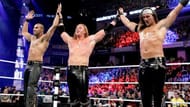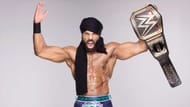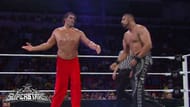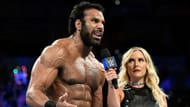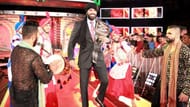Q: Could you tell us about your Indian connection? Which part of India do you come from and do you get to visit India often?
JM: I’m a Punjabi from Punjab. I'm from Kang Arayan, in the district of Jalandhar, but I don’t get to visit as much as I like to.
Q: WWE has been trying to consolidate its market in India for awhile. As a wrestler of Indian origin, how much pressure is there on you to maintain your character and fitness and break the barrier?
JM: Yes, definitely, WWE is looking to expand in India. It already has a huge presence in India. So I believe, alongside other Indian Superstars like the Singh Brothers, Akam in NXT, Lovepreet (Kishan Raftar), I think the more Indian wrestlers come, the bigger the Indian audience becomes, the bigger the WWE Universe in India becomes, which I think would be a great thing because our Indian fans are very passionate.
I would love to do more live shows in India – because I know the last two shows in Delhi last year were a huge success, they were both sold out. I would love to see WWE all across India, in Punjab, Mumbai and Delhi.
Q: How do American fans make of your Indian background? Do they see you as another wrestler?
JM: Actually, it’s a very unique dynamic because the American fans boo me – and sometimes in my promos, I say that America doesn’t accept diversity, which is all character stuff. But I like this unique dynamic of how Indians really like me, even American Indian fans like me. In shows here in the USA, a lot of the crowd has Indian fans who are cheering for me, but the American fans are booing for me.
I think it’s very unique. It reminds me of the time of Bret Hart, who was a huge and successful star in Canada – Canadian fans would cheer him, but when he was wrestling in the USA, they would (fans) boo him out of the building. I think it is a very similar situation.
Q: Do you follow any Indian customs at home?
JM: Yes, I do. Diwali, obviously, is a festival of lights. I do know when Holi is, but we don’t celebrate it here in the USA. I might get in trouble throwing colours in the street. I’m Sikh, so Baisakhi is big for me, and Diwali is big, we go to the Gurdwara. I do follow Indian customs and celebrate holidays.
Q: Tell us about your fight with Randy Orton at Backlash? And what preparations are you doing for the next one with Orton in the next pay-per-view?
JM: Yeah, I thought it was a great fight. I didn’t underestimate Randy’s abilities going into the match. I knew he’s a world calibre Superstar and 13-time WWE World Champion. But, I was aware of his weakness; I knew he had shoulder surgery in the past and shoulder problems.
I exploited that problem and walked away with the WWE Championship. And I intend to keep the WWE Championship at our next fight. But I can’t reveal my gameplan right now, but I have something in mind for the next fight which will ensure that I walk out with the WWE Championship.
Q: In the recent past, we’ve seen you adopt a new move like The Khallas and a few other moves that have really upped your game. Can you tell us a little about that and how you’ve developed these moves to become this Championship-calibre Superstar?
JM: To be a WWE Superstar you’ve to constantly be evolving and improving. I study a lot of tapes, I watch a lot of old wrestling matches and see moves that work and moves that don’t work. I watch guys that are similar to my size, frame and body shape and the moves they do. Because it’s pointless for me to watch high-flying moves or guys that weigh 300+ pound power moves. I’m a unique blend of speed, size and light – I’m only 230 pounds but I’m very strong.
I watch guys who are similar to my body type and see what kind of moves they do, and see what works and doesn’t, and based of that I try new stuff on live events. So, if they’re not successful I can scrap it and take it out of my repertoire.
Q: When did you decide that you wanted to be a pro wrestler? Who helped you on this journey of yours?
JM: As long as I can remember, I wanted to be a WWE Superstar. I watched WWE television when I was a child. Along the journey, the ones that have helped me – my main trainer was ‘Bad News’ Allen, who is also known as Bad News Brown in WWE. My uncle Gama Singh helped me a lot. He was wrestling with Stampede Wrestling in Canada and all over the world, he helped me a lot.
Once I got signed by WWE Dusty Rhodes helped me, Steve Keirn, Norman Smiley – a lot of the good trainers; Dr. Tom Prichard helped me a lot. Even to this day many of the producers help me – Dean Malenko helps me, Jamie Noble helps me... I’m constantly learning, and I constantly need help and I’m constantly seeking advice from people who are more experienced than me.
Q: Who has had the greatest influence on your life?
JM: The greatest influence on my life, I would say, my original trainer, Bad News Brown. He taught me so much not only in wrestling but taught me so much in real life – what it is to be a man, taking care of your family, and that life outside of the ring is also very important, he taught me that.
Q: If you had to change anything about the wrestling industry, what would it be?
JM: I would like to change how it is perceived by the average person. A lot of time we don’t get the credit we deserve for being: a) Athletic – We only have one take; it is not like a movie scene where you can re-shoot. It’s live television, we have to react on the spot.
So, I don’t think we get enough credit cause we’re not only athletes, we’re also actors, stuntman... everything taken into consideration; we travel so much, we have no off season, we work all year long. The longest running episodic television show is RAW; so, I would like to see WWE and professional wrestling get more credit than it’s given.
Q: What were the major challenges initially when you wanted to be a wrestler in WWE?
JM: The initial challenge was to get recognised by WWE because there are millions who watch the WWE Superstars and thousands who are actively pursuing it, in training schools and wrestling all over the world. I was sending tapes to WWE, I was e-mailing WWE... so getting recognised is the very difficult part, and after that, obviously, the training is very intense for wrestling.
Not only do you have to train for wrestling, but you have to workout, be dieting constantly, and sacrifice a lot of your personal life. People of my age are partying, going on vacations and spending time with their family. I have to sacrifice those things but it’s all worth it because I’m WWE Champion in the largest sports entertainment company in the world.
Q: You’ve spoken about your training and fitness regime. Could you share your fitness regime?
JM: Every morning before I eat, I drink water, maybe black coffee with no sugar... zero calories, I don’t consume sugar. And then I do, probably, 25-30 minutes of cardio, and then I eat. I have a very clean diet – oatmeal, egg white, protein shake, bananas, and then I lift weights.
And every day – I started this recently – I do 30 minutes of yoga every day. Stretching is very important for recovery and injury prevention. And most of my workouts are athletic-based workouts alongside body-building workouts – not only do I want to look good, I also want to perform well.
Q: In WWE, everybody has a strategy and signature style. Do you have any particular strategy?
JM: Yeah, I’m still discovering myself and discovering my wrestling potential. I’m 30 years old, so I haven’t even hit my prime yet. But I’m working on new strategies; I like to see who I’m wrestling because my strategy when I’m wrestling Big Show will be different to wrestling Dolph Ziggler. So, I see who I’m wrestling and then I see what their body type is, their weakness – find that weakness, exploit it and try to capitalise.
Q: Whom do you see as your biggest competitor in WWE?
JM: At the moment it is Randy Orton, but, I see John Cena – when he returns – as my biggest competition. I have the WWE Championship, which means I’m the face of WWE, and for a long time John Cena is the face of WWE, and I know he’s not going to give up that title as the face of WWE anytime soon. So, I see him coming to challenge, but in the meantime, I’ve Randy Orton, who I have a match with at Money in the Bank and I look to retain my championship.
Q: How do you feel about representing India after the Great Khali? For a decade, Khali was representing India. Do you feel any pressure representing India?
JM: I’m very proud to be representing India after Khali. Khali is my good friend, we talk a couple of times a week, he’s like my big brother. He’s my role model in wrestling. I see the success that Khali has had and how he’s represented India so well, in such a positive light, becoming champion.
My goal is the same, represent India as a champion and show the world that India has world-class athletes and we can be the best. I feel pressure but it’s a good pressure, I want pressure because I thrive off pressure. I use that pressure to drive me to keep winning matches and push me to train harder and keep the WWE Championship.
Q: What would be your advice to budding wrestlers whether they’re from India or anywhere else in the world?
JM: My advice would be to stay motivated, stay working hard as you never know when your break is going to come. Just when you think you should give up, a big break is right around the corner. Stay focused, stay driven, take care of your body, stay healthy and stay away from drugs. Respect yourself, respect your coaches, respect your elders, and keep working hard. No dream is impossible; anything is possible as long as you’re willing to work hard for it.
Q: What are three points for budding wrestlers to keep in mind?
JM: For someone aspiring to be a WWE Superstar, find a reputable school, reputable trainer – in India, Great Khali has an Academy in Jalandhar. He brings his coaches from the USA, it’s a very good school, I’d recommend for someone in India and it’s the No. 1 school in India.
Secondly, take care of your health, make fitness a priority, eat a good diet, train hard, take appropriate rest and stay away from bad habits.
Lastly, keep working hard regardless if anyone says that “you’re never going to make it”, there will be bumps in your journey. Stay consistent, stay working hard, and no dream is impossible. Anything is possible.
Q: Are there any challenges that you faced and how did you overcome them? For example, with 3MB, it was not doing as well as it could in comparison with The New Day and how they’re doing right now.
JM: Yeah, definitely, that was a challenge. I also got released in 2014 which was a challenge and I had to go away and reinvent myself. Through hard work and through consistency, I came back and I keep on improving.
So, that was a huge challenge – going from 3MB to being released; I could have given up, I could have said, “I’ve already wrestled in WWE, my dream, and have already accomplished my goals.” But I stayed hungry, and I want to be one of the greats; I just don’t want to be a WWE Superstar. I want to be a champion and stay champion.
Q: When did you realise that you needed to make a physical transformation? Was it when you were with 3MB or in the indies?
JM: It was when I was with the indies. I didn’t really care how I looked and was drinking too much beer. One day I just quit drinking and literally two months to the day, WWE called me and said, “We’re going to sign you back.” I don’t think it's a coincidence; I believe if I hadn’t stopped then, WWE wouldn’t have called because I was at home for two years, not caring. As soon as I started caring, everybody else started caring and I was signed back. It definitely was a good step and good decision I made.
Q: WWE is very competitive. There are many top dogs in the scene with Randy Orton, AJ Styles, and Shinsuke Nakamura, who has just moved from NXT. How do you handle the competition and still be the best and remain the face of the company?
JM: It’s all mental – I know that nobody is out-working me, I know that nobody is out-training me and nobody is out-dieting me. I work my hardest in the ring and I leave it all out there. 100% of the time I give it my all and my all is better than anyone else’s. I know nobody out there is putting in an 110% like I am and that’s where I get my confidence from.
Q: How did you cope with being released from WWE?
JM: Obviously, it’s not an exciting time to be released from WWE because my dream was to be a WWE Superstar and to have that taken away from you is rough, but that’s life. Life has its ups and downs, and that time was my down, but nobody stays down forever; you can rise back up and that’s exactly what I did. To get back to WWE, I had to put in 100% effort, 100% work and I made a decision to give it my all, and here I am – WWE Champion.
Q: What’s been the biggest high in your career? Apart from being WWE Champion, what’s your next goal in WWE?
JM: The biggest high in WWE next to becoming the WWE Champion is my debut in WWE. When I debuted with The Great Khali in 2001, it was such a special moment for me because I had worked so hard to get to that point. Since I’ve been a kid, it’s been a dream to be a WWE Superstar.
My next goal is to headling WrestleMania. I’m looking forward to that; I want to walk into WrestleMania as WWE Champion and walk out as WWE Champion. I’m also looking forward to the upcoming challenges. SmackDown has a great roster – we have Shinsuke Nakamura, Kevin Owens, AJ Styles, John Cena – it really is the who’s who of professional wrestling. So I’m looking forward to defeating all these great challenges and establishing myself as a great champion and as one of the all-time greats.
The following questions were asked by Akhilesh Gannavarapu of theringsideview.com
Q: How much of an influence or input did Vince McMahon have in your character development since you moved to SmackDown LIVE?
JM: Yeah, Vince has been very hands-on, after every match and every promo that I do, Vince is the first person that I come and see for advice because Vince is truly a wrestling genius, sports entertainment genius.
This empire that he built – he started from humble beginnings – and to see what WWE is right now, a global powerhouse in sports entertainment, the largest entity in sports entertainment, so, obviously, he knows what he’s doing. He’s built many stars in the past and will continue to build stars... I’m very hands-on with Vince – from character, promo, match-wise, everything.
Q: Your WWE Championship victory elicited strong reactions from fans. How important or difficult is it in this day and age to evoke such a response from the WWE Universe?
JM: To shock the WWE Universe the way I did is a great feeling and it doesn’t happen very often. You could see that after I won the championship they showed the crowd in shock, their faces, their jaws hit the ground. I can’t remember the last time that something evoked that kind of emotion, that kind of response.
There was a unique dynamic even in the crowd during that match. Some were chanting “Jinder sucks”, to “Let’s go Jinder”, almost like how John Cena. That’s a cool dynamic; as long as the WWE Universe is making a noise – whether it is a good noise or bad noise, that’s what I like to see.
Q: Drew Galloway is a top star in NXT and you’re the WWE Champion – looking back at when you were in 3MB and the fans loved you, can you tell us how you’ve fought against the odds to be where you are now?
JM: We’re proof – me, Heath and Drew (former members of 3MB) – are proof that anything is possible, it doesn’t matter where you are on the card. You could be the opening match, it is possible to get to the top of the card, through hard work. WWE is great, it gives people opportunities who deserve opportunities, Vince rewards hard work, WWE rewards hard work, so it motivates the rest of the locker room – they’ve seen me go from the bottom of the card to the top.
Q: SmackDown is hailed as the land of opportunities. When you moved to SmackDown LIVE did you think you would be able to climb the mountain in such a short period?
JM: I knew that I would be able to climb the mountain, but in such a short period, I didn’t think so. SmackDown is the land of opportunity and I’m living proof of that. I was given the opportunity in the No. 1 contender’s match and I took advantage of the opportunity. I am very thankful for the opportunities. I was very excited when I got moved to SmackDown because I knew it would be a fresh start, which it turned out to be.
Q: Do you think there’s more pressure on you at MITB PPV when you face Randy Orton?
JM: Yes, of course, winning it (WWE Championship) is one thing, but retaining it is another. I plan on being a long-term champion. I want to be a champion for years to come; I want to be one of the greatest champions of all time. This is good pressure, I need this pressure because pressure makes me work harder.
It took hard work to get to the championship and win the championship, but it’s going to get even harder. I’m going to be training and add more preparation to my matches because I plan on staying champion for a long time.
Q: Triple H said that when you worked previously you were still too young, you were not mature enough, which you yourself admitted to being. In the past couple of years, how have you matured as a person and wrestler?
JM: Yeah, definitely, when I came to WWE, I was signed when I was 23 and the SmackDown main roster when I was 24. I wasn’t ready for the responsibility and wasn’t seasoned enough as a wrestler and in-ring performer. I’m 30 now, but I still haven’t hit my prime; I’m still getting better every match, I’m still coming back every week in better shape.
So, to think what can I be a year from, or three years from now or five years from now, I truly believe that I will be one of the all-time greats. Triple H did mention the fact that me and Drew (McIntyre) were a couple of kids back then, but now we’re grown men. We’re more mature outside the ring, I have my focus, I have my drive, which is very important. I believe that I haven’t hit my peak yet, I’m just starting.
Q: Who is your dream opponent in the WWE?
JM: I think my dream opponent is Brock Lesnar. Imagine that match – Champion vs Champion, WWE Champion vs Universal Champion. He is my dream opponent because if I can knock off Brock Lesnar that would truly solidify me... I’m the best and let the world know that the WWE Champion is better than Universal Champion.
